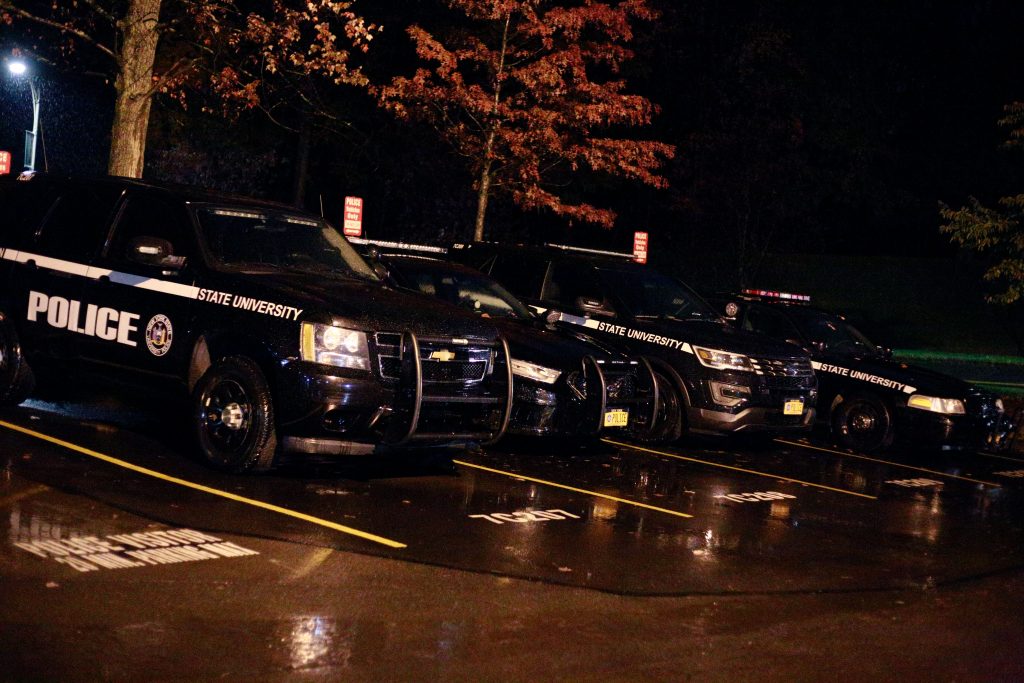
At 11 p.m. on the Friday before Halloween, most Binghamton University students would be heading to Downtown Binghamton, but instead, I was sitting in a chair outside the office of Binghamton’s New York State University Police.
I was not arrested or hurt; rather, I was eagerly awaiting a night where I would be watching officers perform traffic stops, negotiate conflicts and deal with intoxicated fellow students. In short, I was getting ready to ride along with Officer Andy Schneider of UPD during HalloWeekend.
According to Schneider, HalloWeekend is one of the busiest times of the academic year for UPD, along with SantaCon and Parade Day. But while students enjoy a night of fun, officers deal with increased traffic problems and alcohol-related incidents. While we were getting in the car, Schneider told me that he expected it would be a busy night.
“This weekend, we have a few more officers on,” Schneider said. “We actually figure out when there’s going to be frat parties and bigger nights so we can have more officers out.”
However, many students start drinking in their dorms before heading off campus, which means that incidents can happen at any point — and anywhere. Five minutes after getting in the car, Schneider slowed down near the University Union next to a group of students who appeared intoxicated and were standing in the middle of the road trying to flag down a taxi. Schneider asked the students to step back onto the curb, and after ensuring everybody was out of the road, he continued driving. We made a few more laps around campus, and each time Schneider approached the University Union, he discovered another crowd of students standing in the road.
“When you have a crowd like that back there, it’s very hard to do other things because you want to keep an eye on them and make sure they are not going in the roadways,” Schneider said. “You also have to watch traffic and make sure they are not going too fast in that area.”
At 11:22 p.m., a call for backup came through the radio, and Schneider pulled up behind another officer who had stopped a vehicle for not yielding at the traffic circle. While the other officer handled the traffic stop, Schneider directed traffic around the incident. Most vehicles slowed down as soon as they saw the flashing lights of the police car, but one vehicle, a white sedan, almost hit Schneider and ignored signals to go around the incident until the last second. As the car flew by, Schneider yelled for it to slow down. According to Schneider, incidents like that are far too common.
“He wasn’t even paying attention and he was going fast,” Schneider said. “I don’t even know if he heard me yell or not.”
We resumed patrolling the campus, and at 11:47 p.m., we saw a female screaming in a parking lot near Physical Facilities. Ahead, several vehicles appeared to be stopped in the middle of the roadway. As Schneider approached, the vehicles began moving and pulling into the parking lot. Schneider asked the occupants of the vehicles what was going on, and they said the female had been drinking at their house party. They said they had been trying to find her because they were worried about her.
Schneider called Harpur’s Ferry ambulance and approached the female, who was lying on the ground. She was conscious and able to respond to Schneider’s questions. She had drank several Coronas and a mojito, and according to the female, it was her first time drinking. Harpur’s Ferry evaluated the female and determined that it was not necessary to transport her to the hospital.
Later on in the night, at 1:16 a.m., Schneider was called to another report of an intoxicated student. This time, the student was male and had passed out on an Off Campus College Transport bus coming from Downtown wearing only his underwear. The male was carrying his costume with him. He was originally resistant to being evaluated by Harpur’s Ferry, but Schneider convinced him to answer the emergency medical technician’s questions. Harpur’s Ferry determined the male did not need to be transported to the hospital, and he was sent home with friends.
Roughly an hour later, at 2:12 a.m., Schneider received a call about a driver who was possibly driving while intoxicated from the Information Booth. Upon investigating the situation, Schneider determined that the driver was not intoxicated, but as he was handling the situation, another vehicle pulled up. The back door of the vehicle opened and an intoxicated male student fell out of the back seat onto the ground. The student dragged himself onto the grass, as his friends exited behind him. Schneider let the other driver go, and approached the group. Harpur’s Ferry was contacted for the intoxicated male; however, after evaluation, it was determined that he would not be transported to the hospital.
According to Schneider, situations like this, in which one incident runs into another, can be challenging to deal with and tend to happen more frequently on busier nights.
“On our busy nights and weekends, it can happen where things just really start [occurring back-to-back],” Schneider said. “It can happen any night, where calls just start piling up, but it’s more prevalent on our heavier days.”
At 3 a.m., Schneider dropped me off in front of my dorm. Although I was ready for bed, he still had a whole night in front of him and would not return home until after 7 a.m., when his shift would end. As I walked away from the car, I looked back just in time to see Schneider drive away and return to his HalloWeekend duties.


